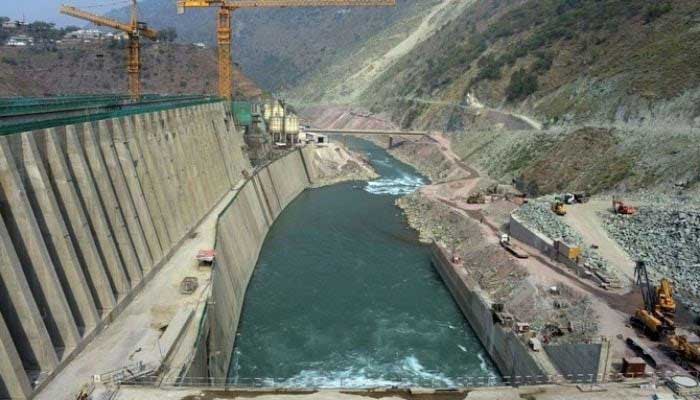Water win
In a defining moment for international law and Pakistan’s principled diplomacy, the Permanent Court of Arbitration (PCA) at The Hague has ruled decisively in favour of Pakistan in the long-standing dispute under the Indus Waters Treaty (IWT). The judgment affirms that India cannot unilaterally suspend or obstruct the arbitration process, rejecting
New Delhi’s attempts to undermine a treaty that has stood for over six decades as a cornerstone of transboundary water cooperation.
This landmark decision confirms Pakistan’s consistent and legally sound position that the IWT is a binding international agreement that cannot be abrogated or placed 'in abeyance' by either party acting alone. The court concluded that India’s objections to the arbitration process have no basis in the treaty or in international law, and that Pakistan’s recourse to lawful arbitration is fully justified.
At the heart of the dispute lies India’s construction of the Kishenganga and Ratle hydroelectric projects on rivers allocated to Pakistan under the treaty. Since 2016, Pakistan has raised serious concerns over technical design aspects that risk reducing downstream water flows and contravene both the spirit and letter of the agreement. India’s refusal to engage in cooperative mechanisms and its subsequent declaration that the Tteaty was 'in abeyance' following the Pahalgam attack further strained an already sensitive issue.
Despite these developments, Pakistan remained steadfast in its adherence to lawful dispute resolution and continued to seek justice through internationally recognised channels.
The court’s judgment not only upholds the validity of the arbitration but also reinforces the core principles of the IWT, which was brokered by the World Bank in 1960 and has since been regarded as a model of water-sharing between riparian states. It ruled unambiguously that there is no provision for unilateral withdrawal or suspension, and that the treaty remains in full effect unless mutually amended or terminated by both signatories. Any attempt to bypass the treaty’s framework is a violation of its binding dispute resolution mechanism.
Pakistan has welcomed the decision as a major diplomatic success and a clear vindication of its principled and consistent position. Pakistan has reiterated its willingness to engage in constructive dialogue with India on all critical matters — including water, Kashmir, trade, and regional security — provided such dialogue is conducted in good faith and mutual respect.
India, for its part, declined to participate in the proceedings and continues to contest the court’s jurisdiction. However, this stance only underscores the contrast between Pakistan’s adherence to international legal processes and India’s approach to the matter. The court’s clarity speaks for itself: obligations under the IWT cannot be ignored, postponed or politicised unilaterally.
As arbitration now proceeds to the substantive examination of the design of India’s projects, Pakistan stands on firm legal and moral ground. The path ahead remains challenging, but this ruling is a resounding endorsement of Pakistan’s approach and a testament to the power of diplomacy guided by law, not force.
In a world where treaties are increasingly tested by shifting geopolitical currents, Pakistan’s victory in the Indus Waters case reaffirms that truth, patience and principled resolve still carry weight in international affairs. This success will not only safeguard Pakistan’s water rights but also resonate globally as a model of responsible statecraft.
The writer is a leading Pakistani industrialist and Managing Director of the MH Dadabhoy Group of Companies. He can be reached at: fkdadabhoy@hotmail.com
-
 Milo Ventimiglia Calls Fatherhood 'pretty Wild Experience' As He Expects Second Baby With Wife Jarah Mariano
Milo Ventimiglia Calls Fatherhood 'pretty Wild Experience' As He Expects Second Baby With Wife Jarah Mariano -
 Chinese Scientists Unveil Advanced AI Model To Support Deep-space Exploration
Chinese Scientists Unveil Advanced AI Model To Support Deep-space Exploration -
 Anthropic’s New AI Tool Wipes Billions Off Cybersecurity Stocks
Anthropic’s New AI Tool Wipes Billions Off Cybersecurity Stocks -
 Trump Announces He Is Sending A Hospital Ship To Greenland Amid Rising Diplomatic Tensions
Trump Announces He Is Sending A Hospital Ship To Greenland Amid Rising Diplomatic Tensions -
 'Never Have I Ever' Star Maitreyi Ramakrishnan Lifts The Lid On How She Avoids Drama At Coffee Shops Due To Her Name
'Never Have I Ever' Star Maitreyi Ramakrishnan Lifts The Lid On How She Avoids Drama At Coffee Shops Due To Her Name -
 Inside Prince William’s Plans For Prince Harry: What Will Happen To Duke Once He’s King
Inside Prince William’s Plans For Prince Harry: What Will Happen To Duke Once He’s King -
 Chyler Leigh Pays Moving Homage To 'Grey’s Anatomy' Co-star Eric Dane: 'He Was Amazing'
Chyler Leigh Pays Moving Homage To 'Grey’s Anatomy' Co-star Eric Dane: 'He Was Amazing' -
 Did You Know Tech CEOs Limit Screen Time For Their Own Kids?
Did You Know Tech CEOs Limit Screen Time For Their Own Kids? -
 Matthew Lillard Admits Fashion Trends Are Not His 'forte'
Matthew Lillard Admits Fashion Trends Are Not His 'forte' -
 SpaceX Launches Another Batch Of Satellites From Cape Canaveral During Late-night Mission On Saturday
SpaceX Launches Another Batch Of Satellites From Cape Canaveral During Late-night Mission On Saturday -
 Princess Beatrice, Eugenie Get Pulled Into Parents’ Epstein Row: ‘At Least Stop Clinging!’
Princess Beatrice, Eugenie Get Pulled Into Parents’ Epstein Row: ‘At Least Stop Clinging!’ -
 Inside Kim Kardashian's Brain Aneurysm Diagnosis
Inside Kim Kardashian's Brain Aneurysm Diagnosis -
 Farmers Turn Down Millions As AI Data Centres Target Rural Land
Farmers Turn Down Millions As AI Data Centres Target Rural Land -
 Trump Announces A Rise In Global Tariffs To 15% In Response To Court Ruling, As Trade Tensions Intensify
Trump Announces A Rise In Global Tariffs To 15% In Response To Court Ruling, As Trade Tensions Intensify -
 Chappell Roan Explains Fame's Effect On Mental Health: 'I Might Quit'
Chappell Roan Explains Fame's Effect On Mental Health: 'I Might Quit' -
 AI Processes Medical Data Faster Than Human Teams, Research Finds
AI Processes Medical Data Faster Than Human Teams, Research Finds




